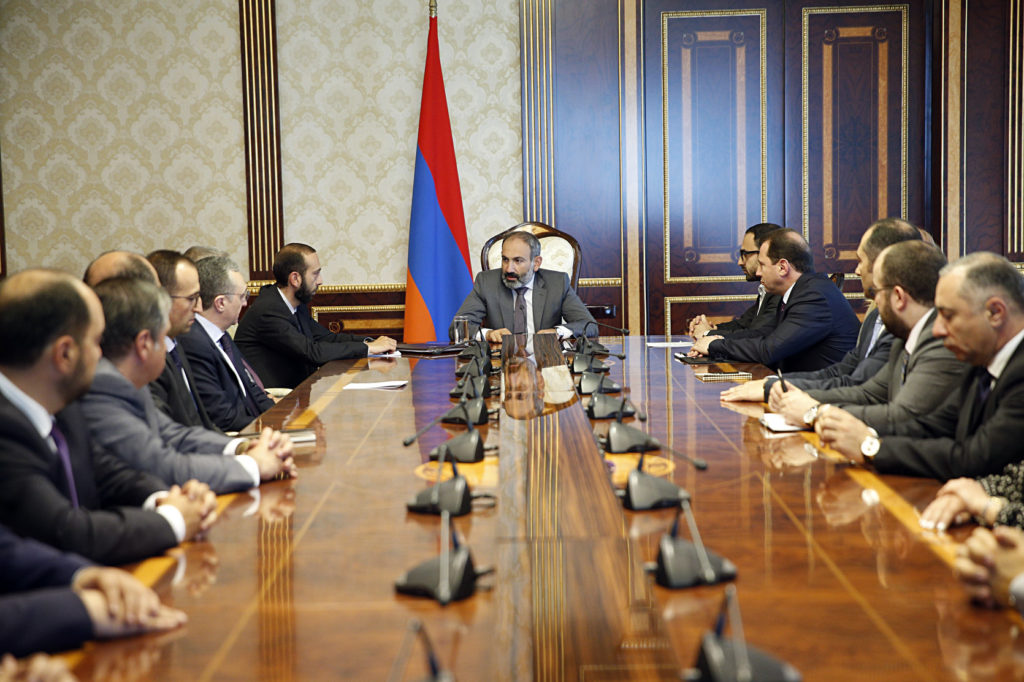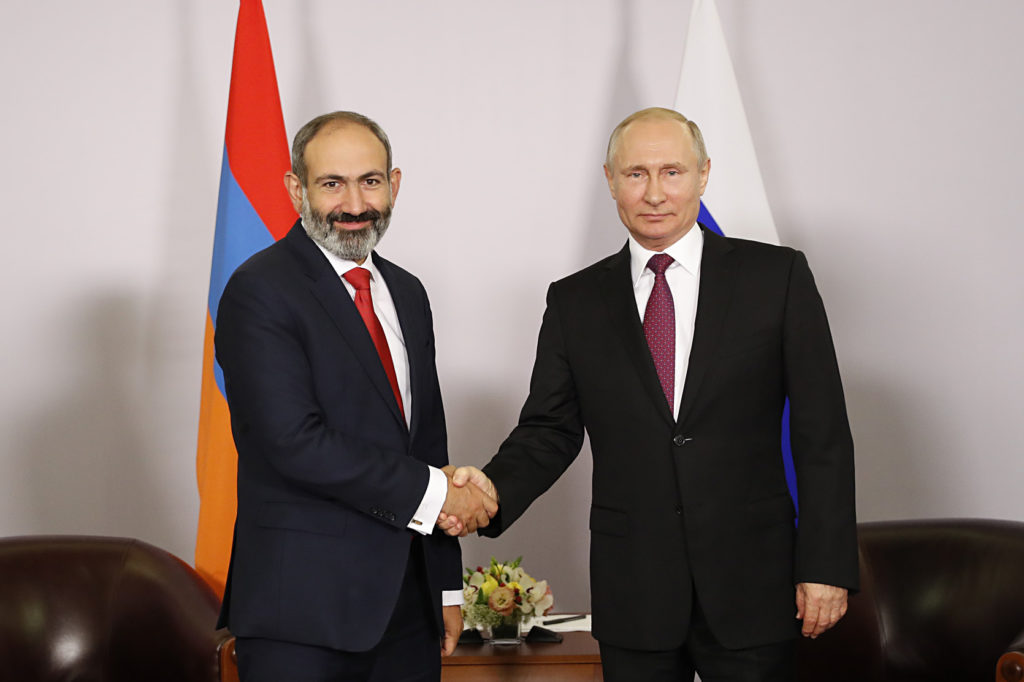
YEREVAN (A.W.)—Armenian President Armen Sarkissian formally appointed newly elected Prime Minister Nikol Pashinyan’s cabinet on Saturday, which included 17 ministers and three deputy prime ministers.
The members of the new cabinet—which were named on May 11 and 12—include several new faces and only four members who held high-ranking positions in Armenia’s previous government, which formally resigned after weeks of wide-scale protests and acts of civil disobedience.
Davit Tonoyan, who had been serving as Acting Minister of Emergency Affairs, will replace outgoing Defense Minsiter Vigen Sargsyan, who resigned on May 8. Last week, outgoing Minister Sargsyan said that the movement that brought down Armenia’s government were not a democratic revolution and noted that they could spell more trouble for the country.
Tonoyan, who is not a member of any party, is no stranger to the country’s defense circles, having served as Deputy Defense Minister between 2010 and 2016 and the head of the ministry’s Department of Defense Policy prior to that.
The country’s Ministry of Foreign Affairs will be headed by Armenia’s former United Nation’s Ambassador and career diplomat Zohrab Mnatsakanyan. Born in Yerevan and also non-partisan, Mnatsakanyan holds a Master’s Degree in Western European Politics from Victoria University, in the U.K., and served as UN Ambassador since 2014.
In his capacity at UN Ambassador, Mnatsakanyan was one of the key negotiators of the Comprehensive and Enhanced Partnership Agreement (CEPA), signed between Armenia and the European Union last November.
Mnatsakanyan will replace outgoing Foreign Minister Edward Nalbandian, whose 10-years as the head of ministry continues to be marred by the ill-fated Armenia-Turkey Protocols, which were signed by him and then-Turkish Foreign Minister Ahmet Davutoglu on Oct. 10, 2009, in Zurich, Switzerland, and were only officially declared null and void earlier this year by Serge Sarkisian’s administration.
The second largest force in Armenia’s National Assembly—the Tsarukyan alliance—will be represented by the Ministers of Energy, Transport and Communications, Emergency Situations, and Sports and Youth Affairs. One of the three deputy prime ministers—46-year-old banker Mher Grigorian—is also a member of controversial businessman Gagik Tsarukyan’s alliance.
The two other deputy prime ministers—Ararat Mirzoyan and Tigran Avinyan—are senior members of Prime Minsiter Pashinyan’s Civil Contract party.
The Armenian Revolutionary Federation (ARF), which pulled out of the coalition with the ruling Republican Party of Armenia (RPA) on April 25, will also be represented in the new cabinet with two ministers. Artsvik Minasyan, who most recently served as Armenia’s Minister of Nature Protection was appointed Minister of Economic Development, while Arthur Khachatryan who was the governor of the Shirak province until the ARF’s departure from government, will be the country’s new Agriculture Minister.
Minister of Labor and Social Affairs Mane Tandilyan—the vice chair of the Bright Armenia Party (Yelk alliance)—and Lilit Makunts—an Associate Professor at the Russian-Armenian University in Yerevan—are the only two female members of the new cabinet.
Prior to being elected on May 8, Pashinyan vowed in his address to the National Assembly that his government would work to advance women’s rights in Armenia and work to engage more women in government. During that address, had also stressed the importance of the Armenian Diaspora and the significant role it must have in Armenia’s future. Pashinyan choice for the country’s new Diaspora Minister was 28-year-old Mkhitar Hayrapetyan, who is the youngest cabinet member. At a press conference on Monday, Hayrapetyan said that his ministry will carry out large-scale immigration and repatriation projects in the near future.
After the appointment of his new cabinet, Pashinyan reaffirmed his commitment that his government will carry our sweeping reforms in the country and asked his cabinet to begin work on the government’s comprehensive policy program, which must be submitted to parliament within the next three weeks.
The approval of the program by Members of the National Assembly is considered a vote of confidence in the new government. The RPA continues to hold a majority of the seats in parliament and has hinted that it is ready to back the program. Without RPA support, the program will be rejection by the National Assembly and would set the path for snap parliamentary elections.
Pashinyan Meets Putin in Sochi
Earlier today, Prime Minister Pashinyan ventured to Sochi to meet with Russian President Vladimir Putin. This marks Pashinyan’s first meeting with a head of state since his impromptu election to the prime minister role. Putin was also first to forward congratulations when word of Pashinyan’s election was released. The meeting took place during a summit of the Eurasian Economic Union (EAEU), the Russia-led economic bloc that Pashinyan had opposed in his days as an opposition politician but to which he now vows to stay loyal.

In addition to reiterating Armenia’s interest in strengthening ties with Russia, Pashinyan praised Russia’s “balanced position” during the protests. “We very highly value this balanced position, which Russia took during our internal political crisis—it was a very constructive position,” Pashinyan said. “This is appreciated not just by our government, but by society.”
President Putin’s comments were similarly positive. “I wish you success, and hope that our relations will develop as positively as they have thus far,” he told Pashinyan.
During his visit, Pashinyan also met with Armenia’s former prime minister and chair of the Board of the Eurasian Economic Commission (EAEC) Tigran Sargsyan.
The post After the Appointment of His New Cabinet, Pashinyan Heads to Sochi and Meets Putin appeared first on The Armenian Weekly.
Source: Armenian Weekly
Link: After the Appointment of His New Cabinet, Pashinyan Heads to Sochi and Meets Putin
